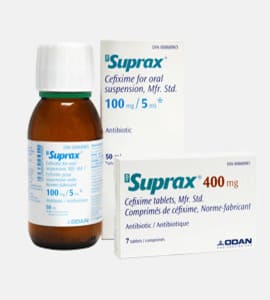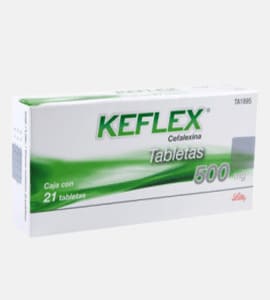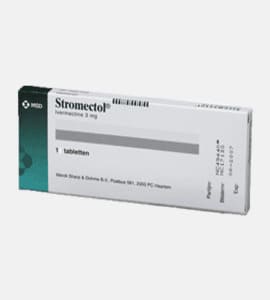Common use
Suprax is a cephalosporin antibiotic which bactericidal effect made it useful for the treatment of infectious diseases such as pharyngitis, tonsillitis, sinusitis, acute and chronic bronchitis, chronic obstructive pulmonary disease, moderate otitis, non-severe infections of the urogenital tract, gonococcal infection of the urethra and cervix, gonorrhoea. It is a broad-spectrum antibiotic active against different aerobic and anaerobic gram-positive and gram-negative organisms including Pseudomonas aeruginosa. Suprax is resistant to beta-lactamases. It is especially active against different streptococcus such as S. pneumoniae, S. pyogenes, S. agalactiae, microorganisms of genus Haemophilus such as H. influenzae, H. parainfluenzae and others: Moraxella catarrhalis, Escherichia coli, Proteus mirabilis, Proteus Vulgaris, Neisseria gonorrhoeae, Klebsiella pneumonia, Klebsiella oxytoca, Pasteurella sp., Providencia, Salmonella, and others.
Dosage and directions
Suprax should be taken with or without food with a big glass of water through equal time periods if it is prescribed as several daily intakes. To avoid stomach upset this medication may be taken with food but this slows absorption of Suprax. If this medication is a suspension liquid shake it before use and measure with a special spoon. Do not take this drug if it was not recommended to you and do not share it with the person who has similar symptoms. Your individual dose should be administered by your physician depending on your condition, age, weight and other factors.
Precautions
Before to take Suprax to inform your doctor if you have had allergic reactions to penicillins or other cephalosporin antibiotics, stomach or intestinal disease such as colitis in history. Patients with kidney disorders require correction of Suprax dosage. Avoid repeated treatment with this medication as it may result in a secondary infection.
Contraindications
Hypersensitivity to Suprax and penicillins, babies younger than 6 month, pregnancy, breastfeeding. Certain cautiousness should be exercised in adult patients, ones with kidney failure, colitis in history.
Possible side effect
Severe allergic reactions as rash, hives, itching, difficulty breathing, swelling of the mouth and face,may occur. In case of bloody stools, decreased urination, fever, red, swollen, blistered, or peeling skin, seizures, diarrhea, nausea or vomiting, abdominal pain, unusual bruising or bleeding, vaginal itching, white spots in the mouth, jaundice notify your doctor about your condition as you may need immediate medical help.
Drug interaction
Probenecid (Benemid) may increase the blood concentration of Suprax by decreasing excretion of Suprax by the kidney. Co-administration of Suprax and aminoglycosides tobramycin (Tobradex) results in additive bacterial killing effects but also may increase damage to the kidney. Exenatide (Byetta) may delay or reduce the absorption of Suprax. Cephalosporins should be administered one hour before exenatide. Concomitant administration of Suprax and Carbamazepine increases the concentration of the latter in blood serum. Suprax may cause a false positive urine ketone and glucose tests.
Missed dose
If you missed a dose take it as soon as you remember. If you take Suprax once daily take the missed dose as soon as you remember. Next dose should be taken in 10-12 hours. If it was prescribed to you to take this medication twice or thrice daily take the missed dose and then the next one in 5-6 or 2-4 hours accordingly. Never double dose this medication.
Overdose
In case of serious and persistent symptoms of allergy or blood in the urine, diarrhea, nausea, upper abdominal pain, vomiting consult your doctor about medical attention.
Storage
Store at room temperature between 59-77 F (15-25 C) away from light and moisture, kids and pets. Do not use after expiration term. Keep prepared suspension in a refrigerator during 14 days but do not freeze it, through away after the term.


 English
English
 Italiano
Italiano
 العربية
العربية
 Čeština
Čeština
 Français
Français
 Español
Español
 Deutsch
Deutsch
 JPY
JPY



















